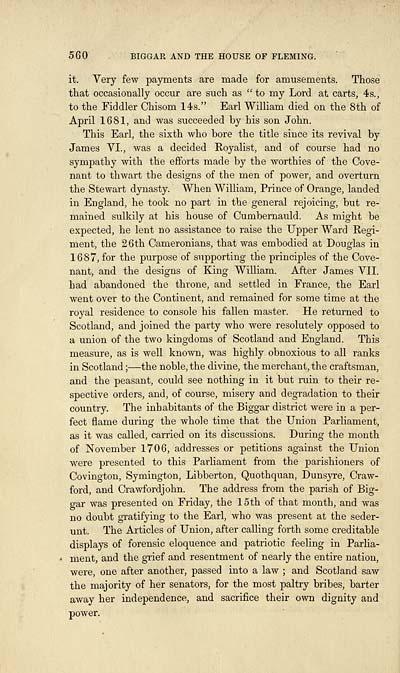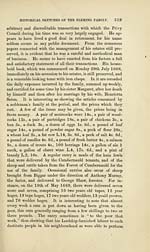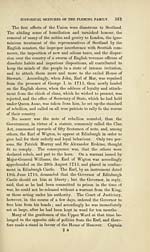Biggar and the House of Fleming
(590) Page 572
Download files
Complete book:
Individual page:
Thumbnail gallery: Grid view | List view

560 BIGGAR AND THE HOUSE OF FLEMING.
it. Very few payments are made for amusements. Those
that occasionally occur are such as "to my Lord at carts, 4s.,
to the Fiddler Chisom 14s." Earl William died on the 8th of
April 1681, and was succeeded by his son John.
This Earl, the sixth who bore the title since its revival by
James VI., was a decided Royalist, and of course had no
sympathy with the efforts made by the worthies of the Cove-
nant to thwart the designs of the men of power, and overturn
the Stewart dynasty. When William, Prince of Orange, landed
in England, he took no part in the general rejoicing, but re-
mained sulkily at his house of Cumbernauld. As might be
expected, he lent no assistance to raise the Upper Ward Regi-
ment, the 26th Cameronians, that was embodied at Douglas in
1687, for the purpose of supporting the principles of the Cove-
nant, and the designs of King William. After James VII.
had abandoned the thi-one, and settled in France, the Earl
went over to the Continent, and remained for some time at the
royal residence to console his fallen master. He returned to
Scotland, and joined the party who were resolutely opposed to
a union of the two kingdoms of Scotland and England. This
measure, as is well known, was highly obnoxious to all ranks
in Scotland ; — the noble, the divine, the merchant, the craftsman,
and the peasant, could see nothing in it but ruin to their re-
spective orders, and, of course, misery and degradation to their
country. The inhabitants of the Biggar district were in a per-
fect flame during the whole time that the Union Parliament,
as it was called, carried on its discussions. During the month
of November 1706, addresses or petitions against the Union
were presented to this Parbament from the parishioners of
Covington, Symington, Libberton, Quothquan, Dunsyre, Craw-
ford, and Crawfordjohn. The address from the parish of Big-
gar was presented on Friday, the 15th of that month, and was
no doubt gratifying to the Earl, who was present at the seder-
unt. The Articles of Union, after calling forth some creditable
displays of forensic eloquence and patriotic feeling in Parba-
ment, and the grief and resentment of nearly the entire nation,
were, one after another, passed into a law ; and Scotland saw
the majority of her senators, for the most paltry bribes, barter
away her independence, and sacrifice their own dignity and
power.
it. Very few payments are made for amusements. Those
that occasionally occur are such as "to my Lord at carts, 4s.,
to the Fiddler Chisom 14s." Earl William died on the 8th of
April 1681, and was succeeded by his son John.
This Earl, the sixth who bore the title since its revival by
James VI., was a decided Royalist, and of course had no
sympathy with the efforts made by the worthies of the Cove-
nant to thwart the designs of the men of power, and overturn
the Stewart dynasty. When William, Prince of Orange, landed
in England, he took no part in the general rejoicing, but re-
mained sulkily at his house of Cumbernauld. As might be
expected, he lent no assistance to raise the Upper Ward Regi-
ment, the 26th Cameronians, that was embodied at Douglas in
1687, for the purpose of supporting the principles of the Cove-
nant, and the designs of King William. After James VII.
had abandoned the thi-one, and settled in France, the Earl
went over to the Continent, and remained for some time at the
royal residence to console his fallen master. He returned to
Scotland, and joined the party who were resolutely opposed to
a union of the two kingdoms of Scotland and England. This
measure, as is well known, was highly obnoxious to all ranks
in Scotland ; — the noble, the divine, the merchant, the craftsman,
and the peasant, could see nothing in it but ruin to their re-
spective orders, and, of course, misery and degradation to their
country. The inhabitants of the Biggar district were in a per-
fect flame during the whole time that the Union Parliament,
as it was called, carried on its discussions. During the month
of November 1706, addresses or petitions against the Union
were presented to this Parbament from the parishioners of
Covington, Symington, Libberton, Quothquan, Dunsyre, Craw-
ford, and Crawfordjohn. The address from the parish of Big-
gar was presented on Friday, the 15th of that month, and was
no doubt gratifying to the Earl, who was present at the seder-
unt. The Articles of Union, after calling forth some creditable
displays of forensic eloquence and patriotic feeling in Parba-
ment, and the grief and resentment of nearly the entire nation,
were, one after another, passed into a law ; and Scotland saw
the majority of her senators, for the most paltry bribes, barter
away her independence, and sacrifice their own dignity and
power.
Set display mode to:
![]() Universal Viewer |
Universal Viewer | ![]() Mirador |
Large image | Transcription
Mirador |
Large image | Transcription
Images and transcriptions on this page, including medium image downloads, may be used under the Creative Commons Attribution 4.0 International Licence unless otherwise stated. ![]()
| Histories of Scottish families > Biggar and the House of Fleming > (590) Page 572 |
|---|
| Permanent URL | https://digital.nls.uk/94846362 |
|---|
| Description | A selection of almost 400 printed items relating to the history of Scottish families, mostly dating from the 19th and early 20th centuries. Includes memoirs, genealogies and clan histories, with a few produced by emigrant families. The earliest family history goes back to AD 916. |
|---|

